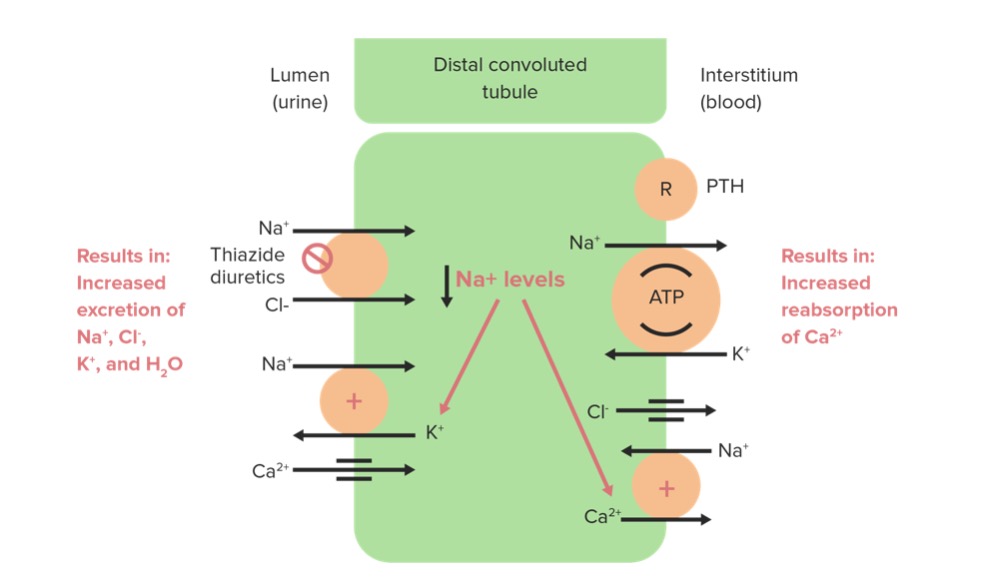Playlist
Show Playlist
Hide Playlist
Beta Blockers – Drugs in Hypertension
-
Slides Hypertension CardiovascularPharm.pdf
-
Download Lecture Overview
00:01 Let's move on to the beta blockers. There are still drugs that are acting through the sympathetic system. 00:09 These are beta receptor antagonists. Now, there's many many beta blockers. 00:14 There's the non-selective or first generation, the second generation which tend to be more beta 1 selective. 00:21 And then the third generation that are non-selective, but also have other types of activity. 00:27 There's the novel third generation drugs. They don't call them fourth generation simply because of legal reasons, but I often call them fourth generation. 00:38 Now, these beta blockers, you can see that there's a huge list. You're not going to remember all of them. 00:43 So, I'm going to cover a couple of them in more detail. 00:48 These are the drugs that I think are worthwhile remembering. In the first generation class, remember propranolol. 00:54 In the second generation class, remember metoprolol as it's prototypical agent and bisoprolol as the one that we use all the time. 01:03 In the third generation class, carvedilol and labetalol are worth remembering. 01:08 And in the novel third generation class, nebivolol which is a relatively new agent coming to the United States and Canada, but has been used extensively in Europe. 01:20 Propranolol. As I said before, it is the prototypical beta blocker, not just of the first generation, but of all beta blockers. It is a short acting drug. And it has relatively poor blood pressure control. 01:34 It is often used in anxiety control and in stage fright. And I always tell my patients and anyone who will listen that it can be used as a lie detector agent, so you can fool a lie detector test if you ever get interrogated by the CIA. 01:51 Metoprolol is the prototypical cardiac beta blocker. It is usually a twice daily drug. 01:57 There are once a day formulation as well. It is most commonly used in post MI patients. 02:04 It is more beta 1 selective. So, you do get less blood pressure control, but you do get a very nice cardiac response. 02:14 Labetalol is a non-selective third generation agent. It has a very wide therapeutic range or margin. 02:21 You can give as little as 100 mg twice a day, to 2,400 mg once a day, or 1,200 mg twice a day. 02:30 So, you have a huge range that you can adjust the medication in. Excellent blood pressure control. 02:37 Really really top notch blood pressure control from this agent. 02:40 And in fact, it is also the most used blood pressure medication in pregnancy. 02:45 And we have almost a million women years of experience in pregnancy using this agent. 02:54 Bisoprolol is a nice drug. It's a once daily beta blocker. It is more beta 1 selective than actually metoprolol is. 03:04 It is often used post MI. And as I said before, it actually has very good blood pressure control. 03:12 So there you have it. The major beta blockers that I think are worth remembering, and I think it's worth remembering the differences between them as well. 03:21 Don't get hung up on first generation, second generation and all that jazz. 03:25 Focus on the effects of beta blockers as a whole. 03:28 Now, I also spoke about beta blockers in our autonomic nervous system lectures too. 03:33 So, it's good to review that stuff when you're looking at your beta blockers. 03:39 Let's mention a couple of need drugs that I think are worth mentioning. 03:45 Nebivolol is a novel third generation selective beta blocker. 03:50 It is more beta 1 selective. It also has nitric oxide activity. So it therefore, also has direct vasodilator effects. 04:01 This is what makes this drug a bit unique. And this is what makes it probably the best for blood pressure control. 04:09 You have to be very careful though, as I mentioned before, whenever you're working through nitric oxide, you can have endothelial dysfunction. What is nice about nebivolol is that it doesn't seem to have that tachyphylaxis effect that the other nitrate based medications have. 04:26 And finally, I want to talk to you about carvedilol. Carvedilol is a non-selective third generation beta blocker. 04:33 It also has some alpha activity, and we use it a lot in heart failure. 04:39 It has relatively poor blood pressure control, but major studies of carvedilol in patients who are being treated for heart failure show significant mortality reduction, and there's significant benefits to using carvedilol. 04:52 So, you'll often see heart failure clinics using carvedilol quite extensively. 04:57 Carvedilol is given either twice or three times daily, so it's an inconvenient drug, but it's very good at what it does.
About the Lecture
The lecture Beta Blockers – Drugs in Hypertension by Pravin Shukle, MD is from the course Cardiovascular Pharmacology. It contains the following chapters:
- β-Blockers
- Notable β-Blockers
- β-Blockers with Additional Activity
Included Quiz Questions
Which beta-blocker is most appropriate for the treatment of hypertension in pregnancy?
- Labetalol
- Metoprolol
- Carvedilol
- Acebutolol
- Nebivolol
Which drug has both alpha- and beta-blocking properties?
- Carvedilol
- Nebivolol
- Metoprolol
- Acebutolol
- Bisoprolol
Customer reviews
5,0 of 5 stars
| 5 Stars |
|
1 |
| 4 Stars |
|
0 |
| 3 Stars |
|
0 |
| 2 Stars |
|
0 |
| 1 Star |
|
0 |
very good lecture, concise and high yield. very helpful for the boards




